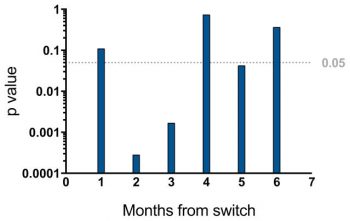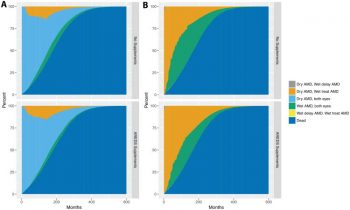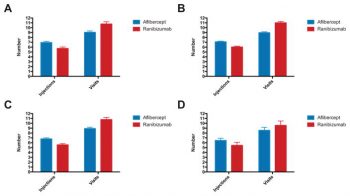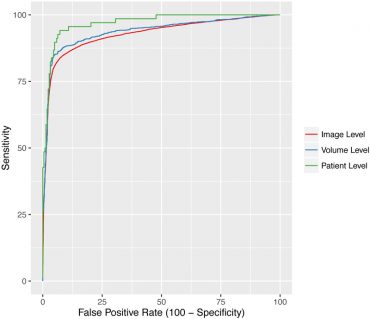Alzheimer's disease affects millions of adults and is the most common type of dementia. Identifying risk factors for Alzheimer's may lead to early detection and preventive measures that are based on a better understanding of the disease processes involved. The eye provides substantial information on brain health, and may give some clues to the pathogenesis of Alzheimer's disease. Eye conditions such as glaucoma, age-related macular degeneration, and diabetic retinopathy have some shared characteristics with Alzheimer's disease, such as progressive neurodegeneration, characteristic amyloid beta deposits, and microvascular disease. This study aimed to investigate potential associations between four eye conditions (glaucoma, age-related macular degeneration, diabetic retinopathy, and cataract) with Alzheimer's disease in a large cohort of patients.
Continue reading "Associations between recent and established ophthalmic conditions and risk of Alzheimer's disease"Visual acuity improvement when switching from ranibizumab to aflibercept is not sustained
In this large, national, multicenter study, the authors evaluated two drugs used to treat age-related macular degeneration, the leading cause of blindness in adults over 50 in the United States. The drugs, ranibizumab and aflibercept, are vascular endothelial growth factor inhibitors, and both are used to slow disease progression (and vision loss) by preventing choroidal neovascularization.
One known problem with these drugs is tachyphylaxis, or a weakening in response to the drug due to long-term or repeated exposure. Because of tachyphylaxis, clinicians sometimes change to a different drug hoping for a better effect, and the authors were interested in whether or not this strategy actually improved outcomes for patients. For a long time in the United Kingdom, ranibizumab was the only vascular endothelial growth factor inhibitor available through the National Health Service for treating age-related macular degeneration. When aflibercept became available, many patients in the UK switched from ranibizumab to aflibercept, which created a perfect population in which to study the effects of changing to a different drug after long term treatment with a vascular endothelial growth factor.
Continue reading "Visual acuity improvement when switching from ranibizumab to aflibercept is not sustained"Cost-effectiveness of age-related macular degeneration study supplements in the UK: combined trial and real-world outcomes data.
Age-related macular degeneration is a leading cause of blindness and visual impairment, and the incidence is expected to increase as the US and UK population ages. Although there are drugs available to slow the progression of this disease, they are expensive and must be administered by intravitreal injection. Studies have found that high-dose antioxidant vitamins and certain minerals may be beneficial for the prevention, however. Although these supplements are frequently prescribed in the US, they are not not routinely funded or prescribed throughout the UK. In this study, the authors developed an economic model using UK cost and prevalence data to investigate the cost-effectiveness of prescribing these vitamin supplements for cases of age-related macular degeneration.
Continue reading "Cost-effectiveness of age-related macular degeneration study supplements in the UK: combined trial and real-world outcomes data."UK AMD/DR EMR REPORT IX: comparative effectiveness of predominantly as needed (PRN) ranibizumab versus continuous aflibercept in UK clinical practice
In this multicenter study in the UK, the authors analyzed the electronic medical records of patients with age-related macular degeneration and compared two different drugs, ranibizumab and aflibercept, commonly used to treat this disease. Neovascular age-related macular degeneration is characterized by choroidal neovascularisation, which is responsible for the majority of visual loss. Intravitreal injections with vascular endothelial growth factor-A inhibitor drugs can reduce abnormal blood vessel growth and improve vision. This studied compared the effectiveness of two of these drugs, ranibizumab and aflibercept, by analyzing the visual acuity outcomes in patients who received either drug over a one year period.
Continue reading "UK AMD/DR EMR REPORT IX: comparative effectiveness of predominantly as needed (PRN) ranibizumab versus continuous aflibercept in UK clinical practice"Deep learning is effective for the classification of OCT images of normal versus Age-related Macular Degeneration
Optical coherence tomography (OCT) is the most commonly obtained imaging modality in ophthalmology and represents a dense and rich imaging dataset when combined with labels derived from the electronic medical record. In this study, the authors developed a novel deep learning approach to distinguish normal OCT images from images from patients with age-related macular degeneration.
Continue reading "Deep learning is effective for the classification of OCT images of normal versus Age-related Macular Degeneration"



